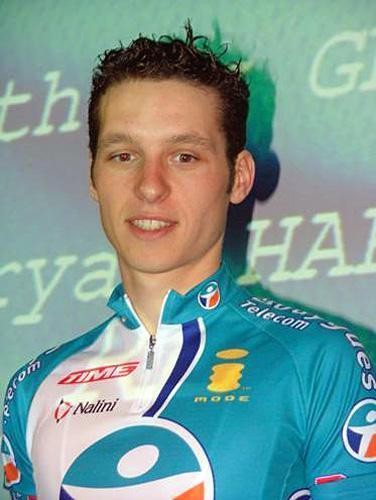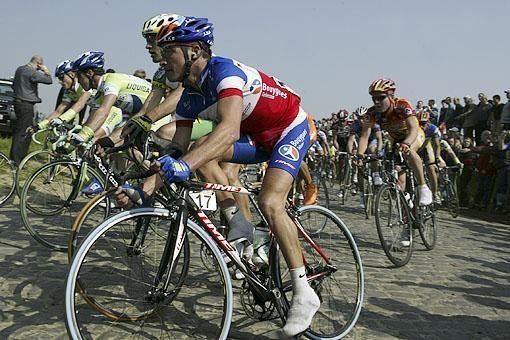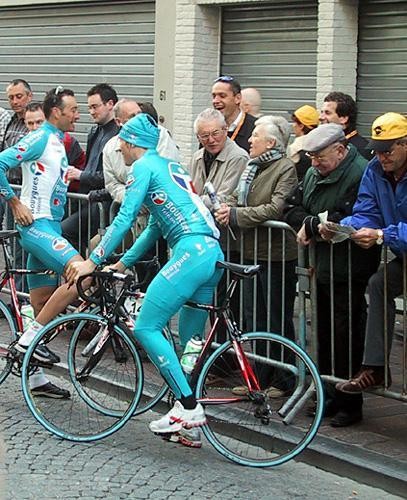France calling
Two riders on the same team; great friends, but with contrasting personalities, riding styles and...




An interview with Thomas Voeckler and Anthony Geslin, April 15, 2005
Two riders on the same team; great friends, but with contrasting personalities, riding styles and objectives. And as Stéphanie Langlais discovered shortly before Paris-Roubaix, Bouyges Telecom's Thomas Voeckler and Anthony Geslin have one more thing in common: they're both motivated to make their mark in the peloton sooner rather than later.
Cyclingnews: We're in the heart of the classics season, are the classics a type of race you like?
Anthony Geslin: The big classics are a dream of mine, whether it's Milan-San Remo, the Tour of Flanders, or Paris-Roubaix.
Thomas Voeckler: I like these races too, because they carry a certain valour and sense of history. That gives them extra prestige. Emotionally, it's a strong feeling and very demanding when you race them. It's also very hard to play a role. You have to have a lot of reserves, experience, and of course, lots of strength. I do think that if fundamentally you're not a specialist, you can develop the qualities necessary through hard work and experience. For me, I'm not worried about finishing in the finale of any [of these] races in the coming years!
AG: For my part, I hope to specialise in the classics. I've got a good turn of speed, I can hold my position well, and I do OK on the small hills, whereas in the stage races, I'm limited by the mountains and the time trials. I haven't ridden a lot of classics yet in my career, but this is the year for me to start and you learn quickly, particularly when there's an expert on the team. Sébastien Chavanel lives in the area [in Tournai, Belgium-ed.]. He knows these roads by heart and helps us understand the strategic locations in the different parcours: the hills and the entrances to the pavé sections. That's important because it's in these spots that placement is critical and it's where the difference is made.
In any event, I'm satisfied with my races in Belgium and I'm going to try to prepare better from this point on. I finished 14th at Het Volk and 17th at the GP E3. At the Tour of Flanders, I was going well until about three or four climbs from the finish, then I got caught behind a split. It was really demanding, and for my first participation I was satisfied to have finished not too far behind the best riders [40th at 6'25 to Tom Boonen-ed.].
Get The Leadout Newsletter
The latest race content, interviews, features, reviews and expert buying guides, direct to your inbox!
CN: Is Paris-Roubaix a classic beyond compare?
TV: It's really a special race. You have to have done it to be able to describe it and know what it's really about. There's a lot of scrambling before the pavé sections. Then, on the pavé, the effort is different than on regular roads because your body isn't used to going all out while taking the shock from the bike.
AG: It's only flat at Paris-Roubaix, and that makes the race more difficult than when there are climbs like in the Tour of Flanders. On the pavé, if the wind is coming from the side, it's as if you're riding by yourself. Plus, in this race, you have to have luck: no punctures and no crashes.
TV: You feel more apprehensive before racing [Paris-Roubaix] because the risks are multiplied. There's more stress and more pressure than usual. But you can't be afraid, because if you are, there's no point in coming. It's so hard that you really have to want to be a part of it. Beyond that, Paris-Roubaix is a part of history and cycling's heritage. And I'm certainly more attracted to it because I'm French. It also feels like the public has a real respect for us.
AG: It's a myth.
CN: Are you going to race the Ardennes classics?
TV: Yes, I'm going to do Amstel Gold Race, the Flèche Wallonne, and Liège-Bastogne-Liège. I haven't had an ideal preparation; I'm going to learn.
AG: I'm not going to race them. I've raced a lot up to this point so I'm going to take a two week break. After that I'll prepare for the Giro.
CN: Are you familiar with the Giro?
AG: No, this will be the first time. I asked to do it precisely because I don't know it. I want to go check it out, but I won't be going just to line up at the start. I want to show myself even if, compared to the Tour de France, the race is more controlled and it's harder to break away. But, as always, I'll be on the offensive. I'm not someone who picks specific objectives throughout the season. Every race interests me and I always give it everything.
CN: Thomas, will you be doing the Giro too?
TV: No, I'll be doing the Vuelta.
CN: Unlike Anthony, don't you have a profile better adapted for stage racing rather than single day races?
TV: No. I refuse to specialise. This is only my fifth year as a pro and I want to give everything a try. I don't feel like I was built for this or that race. There isn't one race that I live for, even if the Tour of Flanders does fascinate me more than the Championship of Zurich, for example. I'm a multi-faceted rider!
CN: How do you feel about the beginning of your season?
TV: I'm not happy. I haven't had any results. Sometimes I've had good legs but I've never finished in the top of the classifications. At the Tour of Flanders, things weren't great, either. I didn't have good legs, and there's no getting around that. I abandoned after 200km. So, I haven't done anything extraordinary. I don't hide behind excuses. The level has been very high. I'm realistic... things could have been better. At the same time, I'm aware of how much work there still is to be done.
CN: Wasn't it hard to start again after an incredible 2004?
TV: I followed my old routines from previous years while training in the winter and the beginning of the season. Because of the work, I've reached a good level, so there's no reason why this year shouldn't go well, even if, most likely, I won't repeat last year's performances. The hardest thing now is to confirm. I'm aware that people are expecting more from me. That adds more pressure, which will only grow as the Tour approaches. I have to keep that separated.
CN: From here on out, you're in greater demand with the media, does that bother you?
TV: When journalists don't come to talk to you, you're not happy because you don't interest anyone. So it wouldn't be appropriate to say that being in the spotlight is annoying! On the contrary, it's a good sign and for the most part enjoyable.
CN: Anthony, how did 2004 go for you?
AG: I did a lot of racing in the first half of the season. I won the Route Adélie, but I arrived at the French national championships tired and didn't ride well. As a result, I wasn't selected for the Tour de France. The directeur sportif decided to take the riders who were fresher. I was a bit disappointed, but the choice was completely normal, and there were no problems because of it. I focused on the end of the season and did a good Paris-Tours [18th].
CN: This year, with the ProTour, are you feeling more pressure?
TV: The ProTour provoked a change in the calendar. All year long, we'll be up against the best in the world, whereas before it was occasional. So it'll be harder, but that will make the team improve. Personally, I hope to build on my experience and progress.
AG: The team as a whole grew and now each of us can concentrate better on our own program, particularly since it's been established in advance. Plus the ProTour will be good for the young riders starting or for those of us who are 25 or 26 years old, since we'll race at least one Grand Tour and we have the opportunity to go up against the best.
TV: We love to race so it's not a concern to have more high-level races on the calendar!
CN: There were some changes in the team during the off-season. Let's start with the arrival of Laurent Brochard...
TV: He was the main recruit for this year. Jean-René Bernaudeau made a very good choice. For the moment, he's the only one in the team to have earned ProTour points. Plus, he knows how to share his experience. He doesn't talk a lot, but what he says has some weight.
AG: When you see how he rides at his age... it sets a good example for the young riders, an example to follow.
CN: There was also the departure of Joseba Beloki...
AG: He had problems with his health then there were things got messed up. The team expected more from him but he didn't have much time to prove himself.
TV: I was proud to ride at his side, next to someone with such an impressive palmarès. But the experience didn't last long. It didn't change my life, we didn't have much of a relationship.
AG: Plus there was the language barrier. He didn't speak French.
CN: Both of you have followed Jean-René Bernaudeau since the beginning; you don't think about taking your chances elsewhere?
TV: You always know what you're leaving, but you never know what you're going to find! Including my years as a junior with Vendée U, the development squad for the pro team, this is my eighth year with Jean-René. And when that's going well, there's no reason to change. I don't need to look somewhere else to re-motivate myself.
At the end of last year, Jean-René had some serious leads in his search for a new team sponsor. I had faith in him and I didn't talk to any other teams. Here we race the way we get along. There are real bonds between us. Otherwise, as far as team structure goes, we have nothing to worry about compared with other teams.
AG: This is my sixth year with Jean-René. I've known the riders and the staff for a long time, and we get along well. It's a bit scary to think about leaving. Other teams have more foreign riders and there's more turnover. We wouldn't have the same bond.
Editor's note: Voeckler finished 80th at 18'16 to winner Tom Boonen at Roubaix, Geslin was 'HD' [outside the time limit].